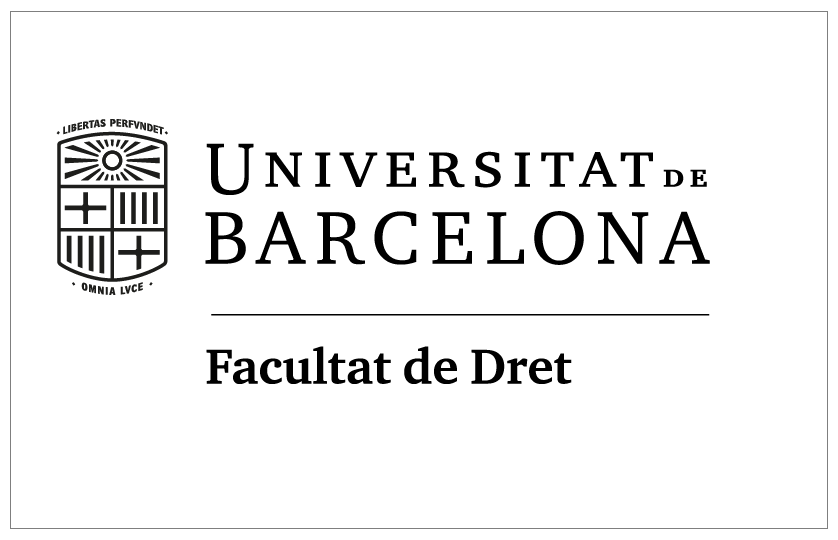zCompleted State Research Projects

Maria Elena Lauroba Lacasa (IP); Antoni Mirambell Abanco; Santiago Espiau Espiau; Juana Marco Molina; Luis Caballol Angelats; Maria Esperanca Ginebra Molins; Esther Arroyo Amayuelas; Maria Luisa Zahino Ruiz; Jaume Tarabal Bosch; Miriam Anderson; Lidia Arnau Raventos; Fernando Badosa Coll; Sabrina Praduroux

The main objective of the research project is to know if the stated manifestations of the criminal copyright law are compatible with the criminal law of a liberal State committed to the principle of responsibility for the fact.
Víctor Gómez Martín (IP); Jose Ignacio Gallego Soler, Ujala Joshi Jubert, Carolina Bolea Bardon, Juan Carlos Hortal Ibarra, Iñigo Ortiz de Urbina Gimeno

The goal of the project is to explore from a theoretical and empirical perspective the behavior of political opposition in the parliamentary arena in Spain, from 1982 to present. To do so we will complement existing studies on voting behavior on legislation and parliamentary scrutiny, with the analysis of more unexplored initiatives: amendments on legislation and parliamentary bills. Some of the questions we want to answer are the following: Do opposition groups introduce a significantly different number of bills and amendments on legislation? Are these amendments efficient, namely, do they transform significantly the content of bills? Do parties follow a responsible model of opposition, being willing to collaborate in policymaking, or, by the contrary, do they base their parliamentary strategies on criticizing the government with no effort to deliver policies? Are the opposition strategies of mainstream and non-mainstream parties significantly different? Do interests’ organizations influence the draft of new legislation and the amending activity of opposition groups? Recent events, including the continued effects of the economic crisis and the entry of new parties in the Spanish parliament, make the analysis of these questions especially relevant.
Anna M. Palau Roqué (IP); Luz M. Muñoz Márquez, Laura Chaqués Bonafont

Immaculada Barral (IP); Vicente Perez Daudi; Isabel Viola Demestre; Domenec Sibina Tomàs; Araya Alicia Estancona Pérez; Núria Mallandrich Miret; Chantal Moll de Alba Lacuve.

Camilo Andrés Cristancho (IP);

Daniel Vázquez (IP); Francisco Mercadal Vidal; Rafael Guasch Martorell; José Machado Plazas; Cristina Roy Pérez; Judith Morales Barceló

Marc Tarrés (IP); Maria del Carmen Gracia Ramos; Fernando Barbancho Tovillas

Spain has an urban society in a preponderantly rural territory: the densely populated urban areas on the coast and in Madrid contrast with a pattern of lower density development in the central zones of the country. Despite evidence of a metropolitanization process, the Spanish political system has not responded to this phenomenon. Indeed, there is a gap between the process of urbanization and metropolitanization and the institutional setting, since there is only one metropolitan government (Barcelona).
The aim of this project is to evaluate the institutional building of metropolitan governance in Spain. Compared to other European countries, in Spain there is a scarce development of metropolitan institutions. This is particularly interesting for two main reasons. First, it exemplifies one of the problems of metropolitan governance: the permanent gap between institutions and the process of metropolitanization. Second, in Spain there is a diversity of models of metropolitan governance, which is useful to analyse the reasons for this variation. METROGOV seeks to provide a comprehensive analytical framework to explain this phenomenon.
Mariona Tomàs Fornés (IP)

The subproject, as a part of the project coordinated by the Manuel Giménez Abad Foundation, aims at contributing to the improvement of the institutional and democratic quality (objective of the whole coordinated project) through the reinforcement of the counter-majority tools in the constitutional democracy. In order to do that, we propose the following: 1) studying the tools available to control the government and the parliamentary majority according to Spanish Constitutional Law and the problems derived from its concrete regulation and functioning in the three government levels (central government, Autonomous Communities and local entities). Such tools can be of political nature (within the Parliament, between both parliamentary chambers and between the constituency and the representative institutions), institutional (independent bodies, Ombudsman or similar entities) and judicial (in particular the Constitutional Court). And 2) a normative amendment proposal of the referred counter-majority institutions and tools, both at the constitutional and legislative level, for effectively controlling the power.
Josep Maria Castellà Andreu (IP) i Enriqueta Expósito Gómez (Co-IP)

José Esteve Pardo (IP)

Alfredo Galán Galán (IP)

The approval of Directives 2019/770 and 2019/771, within a subject-matter that is essentially the same- conformity regulation with the contract within different aims- it is an example that the coexistence of legal systems that look into the same topic from a different point of view could put in danger the legal certainty. We will analyze the option of bringing together in a unique normative instrument the rules on conformity with the contract. We will also assess whether or not the consumer law remedies can also be applicable into peers’ contractual relations and whether or not it is convenient to extend the regulation also to the onerous contracts for the purchase of goods and services, beyond the ones that are in the scope of the directives. We will also discuss the opportunity to establish a supra conformity concept that could be able to generalize its remedies to other breach of contract cases. Finally, we will approach the necessity to encourage consumer mediation and arbitration within the goal of establish its enforceability within the small claims disputes, in order to dejudicialize the courts.
Mariló Gramunt Fombuena (IP); Gemma Rubio Gimeno (IP)

Helena Torroja Mateu (IP), Jessica María Almqvist, Rafael Arenas García, Juan María Bilbao Ubillos, José Fernando Lozano Contreras, Araceli Mangas Martín, Maria Argelia Queralt Jimenez

The aim of this project is arround the transparency, understood as an institutionalized and interactive relationship between the public sector and citizens, and the research question that is generated arises from the need to analyze the impact in two areas: in terms of intervention in the dynamics, the structures and functioning of public organizations and in the hypothetical increase in diffuse support -legitimacy- of citizens towards institutions. In this last sense of the relationship, it is intended to test the will to punish as a trigger for the social demand for transparency.
Jaume Magre Ferran (IP)

Debates about AF future, caused by the new scenario of systemic disorder, have invited to ask: How should the Spanish armed forces adapt to the redefinition of threats to security in Spanish and European societies?
We hypothesize as follows: AF will involve towards an actor integrated. It will be managed from a shared trunk and that will diversify technically. Likewise, the dynamics of European synergies will mean the gradual transformation into a single European actor.
We will investigate public opinion, the political class and the lobby of this sector. Then, we will call a simultaneous Delphi process to fifteen experts.
- The shortcomings of the current international legal framework for an effective response to the degradation of biodiversity and global warming and their effects on global public health.
- The global challenges, in institutional terms, faced by the international community in relation to the current health crisis and which require progress in international cooperation and coordination between international regulatory regimes, such as those for biodiversity, climate change and health, thus generating synergies and avoiding sterile duplication of efforts.
- The international regulatory proposals which, in the overall framework of the post-2020 Biodiversity Strategy and in the process of increasing ambition in the commitments of the Paris Agreement, could facilitate greater integration of aspects related to the protection of global public health.

The Research project pursues the overall objective of identifying the challenges and opportunities that the COVID-19 crisis has created in relation to the international and European legal frameworks applicable to the conservation and international protection of biodiversity and to the fight against climate change. In turn, it aims to provide possible responses that will strengthen international cooperation and the creation of synergies between these fields in order to influence, in the medium and long term, global public health and the post-COVID-19 recovery process.
To this end, the project is essentially focused on three dimensions:
Maria del Mar Campins Eritja (IP), Francesc Xavier Pons Rafols, Javier Fernandez Pons, Josep Maria de Dios Marcer, Teresa Fajardo del Castillo, Marta Abegón Novella, Pol Pallàs Secall

The purpose of this project is to study the international and EU regulatory constraints that (by themselves and/or through their interactions) are likely to limit the scope of decisions and actions aimed at alleviating poverty from the point of view of the SDGs and international human rights law. The reference of the proposed analysis is a Member State of the European Union (Spain), due to its high rate of poverty and exclusion in relation to the countries of the European Union (EU) and due to the special incidence of the COVID-19 pandemic on this country. Therefore, the examination carried out of the regulatory conditions in Spain is projected on a multilevel governance scenario.
Jordi Bonet Pérez (IP), Jose Antonio Estevez Araujo (coIP), Marta Ortega Gomez, Antonio Gimenez Merino. Juan Antonio Alujas Ruiz. David Bondia Garcia. Javier Fernandez Pons, Antonio Madrid Perez, Jose Luis Gordillo Ferre, Rosa Ana Alija Fernandez, Pepa Burriel Rodriguez, Maria Julia Barcelo, Elisenda Calvet Martinez

The aim of this project is to define the guarantees of citizens before the use of artificial intelligence by public administration in the services personalization.
The project addresses a topic that is new to previous research, on which there is little legal literature and which requires an interdisciplinary approach, guaranteed by the composition of the research team and the working group.
This is the improvement of public services in of the process of digital transformation of public administration through the use of artificial intellgence. This improvement will be studied from the perspective of the personalization of public services and the fight against maladministration, fraud and corruption.
Although this improvement is linked to the relevant right to good administration, there is no doubt that it presents various risks that will be considered. On the one hand, the possibilities and limits of the exercise of discretionary administrative powers in a fully automated manner. On the other hand, possible software errors affecting the proper functioning of public services within the framework of artificial intelligence. Thirdly, the biases, both cognitive of programmers and those generated by automatic learning. In fourth place, the possible manipulation of citizens generated by the union of the contributions of behavioral sciences and artificial intelligence (hypernudging).
Finally, excessive public technological dependence on the private sector could lead to the surreptitious transfer of public functions to the latter.
The project will analyze the improvement of public services, through the two routes mentioned, and its risks, proposing mechanisms to prevent and mitigate them (use of nudges, organizational and procedural designs, role of digital charters...).
Julio Ponce Sole (IP), Agusti Cerrillo Martinez (coIP), Clara Isabel Velasco Rico, Joost Johannes Joosten, Ramon Lluis Galindo Caldes, Anahi Casadesus de Mingo, Oscar Capdeferro Villagrasa, Javier Miranzo Diaz, Eric Sancho Adamson

Contemporary societies are exposed to important global threats that have the potential to deeply affect our life conditions. Arguably, two of the most relevant threats are global pandemics such as COVID-19 and climate change. These two threats, although substantially different in nature, share a number of similarities: they are exogenous, global and pose highly complex policy problems that require citizen cooperation to be addressed. In a democratic context, it is essential to build citizen support for mitigation policies and ensure citizens’ compliance. Moreover, the magnitude and nature of these threats may affect the democratic political systems, causing a shift in the pre-existing political equilibrium. In this project, we propose to study the effect of these threats on citizens’ political attitudes and preferences.
Albert Falco Gimeno (IP), Jordi Muñoz Mendoza, Marc Guinjoan Cesena, Francesc Amat Maltas, Sergi Ferrer Juan, Pau Vall Prat

Fifteen years ago, trial judges in Spain approved an average of 80% of restraining orders filed in court, and the number of judges deciding at very different rates of approval (judicial inequality) was quite low. In 2018, the rate of approval of restraining orders in Spain is 5 points lower, and judicial inequality has doubled across courts and regionally. Paradoxically, female judges now represent 70% of trial court judges in Spain, and they hear on most restraining orders filed. Using extremely rich data from varied sources (most of them public), this project deploys a quantitative empirical strategy to address this puzzle and untangle the causes and consequences of judicial inequality. The main research question of this project is whether and in what ways female and male lower trial judges decide cases differently, and how these differences interact with institutional design to shape judicial inequality in Spain.
Joan Josep Vallbé Fernández (IP), Markus González Beilfuss, Albert Falcó Gimeno, Tània Verge Mestre

When courts make unexpected or unpopular decisions (e.g., regarding the recent case of La Manada group rape in Navarra, Spain) we assume that factors such as gender and policy preferences (e.g., ideology) may affect judges’ decisions. At the same time, the institutional context of such decisions (the judicial and political systems) sets a structure of incentives that may change the way these factors work and eventually how judges decide. The common consequence of such mechanism is judicial inequality—the fact that different judges can make opposite decisions when deciding on very similar cases. The main research question of this project is how personal, political and institutional mechanisms work in the judicial system to shape judicial inequality in Spain. This project develops and tests a theory of strategic behavior in a multiple-level hierarchy within the context of a unitary judiciary such as Spain. To this end, the project will analyze data at three relevant judicial levels (trial courts, regional appellate courts and the Supreme Court) to (1) analyze the effect of gender on collegiate judicial decisions in Spain; (2) measure and analyze judicial ideal points in Spain; and (3) build and test a principal-agent theory of judicial behavior within a multiple-level hierarchy.
Joan Josep Vallbé Fernández (IP), Lluís Medir Tejado, Xavier Arbós Marín

Francisca Pérez Madrid (IP), Ana María Vega Gutiérrez, Carmen Peña García, M. Teresa Areces Piñol, Isabel Martínez Navas, Marcos González Sánchez, Santiago Cañamares Arriba, Maria Mut Bosque, Rafael Palomino Lozano, Silvia Meseguer Velasco, María Jesús Gutiérrez del Moral, Monserrat Gas Aixendri

Vicenç Aguado Cudolà (IP), Juan Antón Mellón (coIP), Tomàs Font Llovet, Miren Jaione Mondragón Ruiz de Lezana, Adela Mesa del Olmo, Mercedes Ortiz Garcia, Xavier Torrens Llambrich, Juan José Mauri Majos, Domènec Sibina Tomàs, Héctor Claudio Silveira Gorski, Liviu Catalin Mara, Alberto de la Peña Varona, Enrique Luján Carbonell, Verónica Yazmin García Morales, Herminio Sánchez de la Barquera Arroyo, Jordi Pacheco Canals, Gemma Álvarez Jiménez, Sandra Antoniazzi, Gabriele Bottino, Alina D. Carmen Nettel Barrera, Francesco Grisostolo, Camille Mialot, Vera Parisio, Óscar Casanovas Ibáñez, Alessandro Calegari, Joan Pere López Pulido, Raquel Prado Pérez, Almudena González García

zCompleted European Research Projects


Jose Maria Castella Andreu (IP), Jaime Magre Ferran, Lluís Medir Tejado, Esther Pano Puey

Silvia Gomez Trinidad (IP); Antoni Font Ribas; Cristina Roy Perez; Maria Concepcion Hill Prados; Luis Caballol Angelats; Maria Asuncion Gual Dalmau



 3 European research projects
3 European research projects